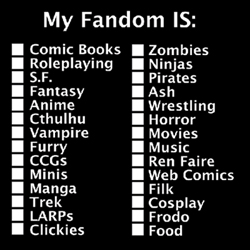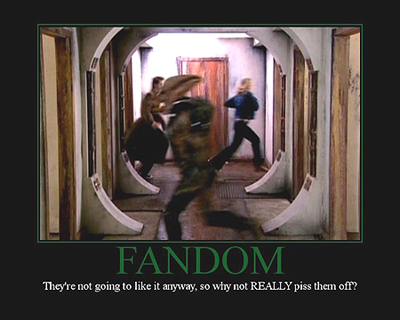Nonconsensual Fandom
Published on July 30th, 2008 in: Issues, Over the Gadfly's Nest |By Jessica Melusine
Even in this age where the geeks seem to rule the earth, where pop culture analysis has jumped out of its academic setting to blogs and Wikipedia, where suddenly everyone now gets a red shirt joke, there are taste police. Even in a culture that is supposed to be tolerant there are issues about how one is supposed to watch, consume, or behave in fan culture.
I call this trend Nonconsensual Fandom.

T-shirt design by Muskrat John
It can come from in-jokes and pushing things, or saying you have to do something, see something, or read something to keep membership in a group. Or it can turn on your and explain why it’s no longer cool to like a particular show, writer, or what-have-you. It’s twisty and hard and leaves me feeling bad.
The worst thing is, sometimes Nonconsensual Fandom can ruin your ability to relate to stories in your own way. I used to watch Buffy The Vampire Slayer with people back in the day. I’m a crier. Things touch me; I cry.
One of the most awful things is sitting around with people watching the same show and realizing people are staring at you like you have suddenly vomited on the sofa because you’ve been crying over the story. It’s the same kind of shaming stare. It feels bad.
One of my worst days ever was the season finale of Buffy. There was a point during which I wanted to scream and jump up and down and cry. . . and everyone sitting around me afterwards talked about how much it sucked and how it was just weak writing and I had to tamp down everything, shut up, and say things I didn’t feel.
This was around self-proclaimed weirdoes, people who were outcasts, like me. I was biting my lip and lying and it was horrible. I had to lie about my feelings. I never want to do that again.
It can be the same problem with love—some fans set themselves apart by not loving, by putting on ultra-critiquishness to show that they’re not actually emotionally involved because that’s bad. This isn’t the same as watching a show uncritically or asking questions.; I’ve seen it as more of a divisive tactic, like “I can’t believe that you liked that book/episode/artist.” Because if you do, then you’re just a drooling fan. It’s a knife’s edge.

FANDOM by The Crayola of Doodah
In another manifestation, this behavior shows up as interrogating a piece of work in what the interrogators wish was a grad school class. Unfortunately, too often this goes right from raising questions and learning into a weird kind of bullying, something which one could argue is much like graduate school itself. The question becomes not how to look at something and ask questions, but how to explain that it’s really not okay to enjoy. Paradoxically, I’ve heard others dither about looking like a fan because they were different—authors, artists or even just people who weren’t really like that.
I’ve also seen the selfsame fans be more exclusive and cliquish than any popular lunch table in any teen movie ever. There were inside jokes that I wasn’t a part of and parties I wasn’t invited to and people at fan conventions who couldn’t pack their luggage carts and noodled around in the damn lobby and well, if you hadn’t been doing this for years, no thanks, not welcome.
Since I could never keep up with the newest show, books, or whatever, I figured why try? And since I didn’t fit in even among the self proclaimed fringe dwellers and I never would, where did that put me?
Pages: 1 2
Time limit is exhausted. Please reload the CAPTCHA.